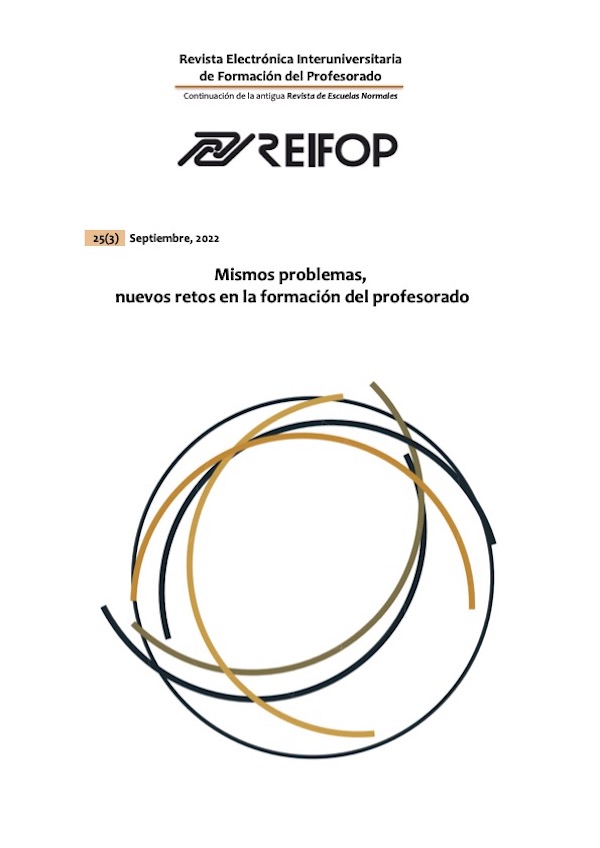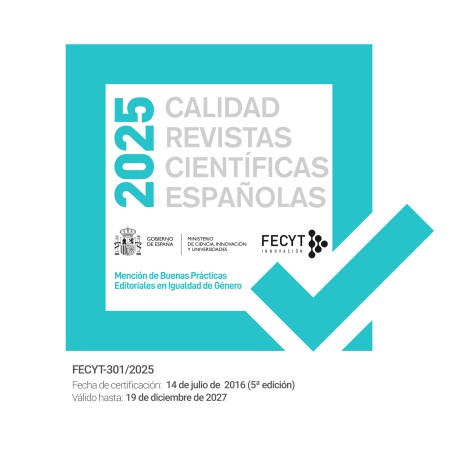Formación de mentores: el proyecto “Mentoring Polito Project” dirigido al profesorado universitario. Rol, competencias y prácticas formativas
Resumen
Esta contribución, a partir de una reflexión sobre el papel, las funciones y las competencias de la figura del mentor en la universidad, profundiza una experiencia de faculty mentoring propuesta en el en el Politécnico de Turín (Italia). En concreto, el proyecto presentado, denominado "Mentoring Polito Project " (M2P), prevé una fase de formación de los participantes en el apoyo profesional de los compañeros a través de dinámicas de peer mentoring, seguida de una experiencia destinada a potenciar las habilidades de acompañamiento didáctico de los compañeros para una enseñanza-aprendizaje más eficaz. En concreto, el proyecto incluye una primera fase de formación teórico-práctica al mentoring y a los roles de mentor y mentee, una segunda fase de experimentación del proceso de acompañamiento a través de la peer observation y la comparación entre pares, seguida de una supervisión individual y grupal y una última fase de evaluación de la experiencia y diseño de la intervención dentro de la Universidad. La formación está a cargo de formadores experimentados y es fundamental para poder llevar a cabo de forma consciente y competente la relación de mentoring. En concreto, se presentará aquí el recorrido realizado y los resultados alcanzados tras la experiencia formativa en la primera edición de M2P, recuperando las motivaciones iniciales, las expectativas de los participantes y su evaluación respecto a las actividades realizadas y las competencias adquiridas.
Descargas
-
Resumen1183
-
PDF720
Citas
Allen, T. D., Eby, L. T., Poteet, M. L., Lentz, E., & Lima, L. (2004). Career benefits associated with mentoring for protégés: A meta-analysis. Journal of applied psychology, 89(1), 127
Baugh, S. G., & Scandura, T. A. (1999). The effect of multiple mentors on protege attitudes toward the work setting. Journal of Social Behavior and Personality, 14(4), 503–521.
Boyle, P., & Boice, B. (1998). Systematic Mentoring for New Faculty Teachers and Graduate Teaching Assistants. Innovative Higher Education, 22(3), 157–179.
Chen, Y-C. (2013). Effect of Reverse Mentoring on Traditional Mentoring Functions. Leadership Manage., 13(3), 199–208.
Chesler, N. C., & Chesler, M. A. (2002). Gender-Informed Mentoring Strategies for Women Engineering Scholars: On Establishing a Caring Community. Journal of Engineering Education, 91(1), 49–55.
Cortese C. (2000). Mentoring e formazione. FOR- Rivista per la formazione,33, 21-56.
De Janasz, S. C., & Sullivan, S. E. (2004). Multiple mentoring in academe: Developing the professorial network. Journal of Vocational Behavior, 64(2), 263–283.
Eret, E., Yerin Güneri, O. Y., & Çapa Aydin, Y. (2018). Evaluation of peer mentoring program in higher education: Does it support smooth transition of new faculty to the academia? Journal of Higher Education and Science, 8(3), 532-541.
Johnson, W. B. (2015). On being a mentor: A guide for higher education faculty.Routledge.
Harnish, D., & Wild, L. A. (1994). Mentoring strategies for faculty development. Studies in Higher Education, 19(2), 191–201.
Higgins, M. C. (2000). The more, the merrier? Multiple developmental relationships and work satisfaction. Journal of Management Development, 19(4), 277–296.
Johnson, M. O., & Gandhi, M. (2015). A mentor training program improves mentoring competency for researchers working with early-career investigators from underrepresented backgrounds. Advances in Health Sciences Education: Theory and Practice, 20(3), 683–689.
Jones, R., & Brown, D. (2011). The mentoring relationship as a complex adaptive system: Finding a model for our experience. Mentoring & Tutoring: Partnership in Learning, 19(4), 401–418.
Knippelmeyer, S. A., & Torraco, R. J. (2007). Mentoring as a Developmental Tool for Higher Education. In Online Submission. Paper presented at the Academy of Human Resource Development International Research Conference in The Americas (Indianapolis, IN, Feb 28-Mar 4, 2007). Retrived from: https://eric.ed.gov/?id=ED504765
Kram, K. E., & Isabella, L.A. (1985). Mentoring Alternatives: The Role of Peer Relationships in Career Development. Academy of Management Journal, 28(1), 110–132.
Lau, C., Ford, J., Van Lieshout, R.J., Saperson, K., McConnell, M., & McCabe, R. (2016). Developing Mentoring Competency: Does a One Session Training Workshop Have Impact? Academic Psychiatry, 40(3), 429-433.
Law, A., Bottenberg, M., Brozick, A., Currie, J., Divall, M., Haines, S., Jolowsky, C., Koh-Knox, C., Leonard, G., Phelps, S., Rao, D., Webster, A., & Yablonski, E. (2014). A Checklist for the Development of Faculty Mentorship Programs. American journal of pharmaceutical education, 78(5), 98.
Le Cornu, R. (2005). Peer Mentoring: Engaging Pre-Service Teachers in Mentoring One Another. Mentoring & Tutoring: Partnership in Learning, 13(3), 355–366.
Levinson, D. J., Darrow, C. N., Klein, E. B., Levinson, M. H., & McKee, B. (1978). The Seasons of a Man’s Life (Vol. 4). Alfred A. Knopf.
Luna, G., & Cullen, D. L. (1995). Empowering the Faculty: Mentoring Redirected and Renewed. ASHE-ERIC Higher Education Report No. 3. ERIC Clearinghouse on Higher Education, One Dupont Circle, N.W.
Murphy, W. (2012). Reverse Mentoring at Work: Fostering Cross-Generational Learning and Developing Millennial Leaders. Human Resource Management, 51(4), 549-573.
Negovan, V. (2006). Mentoring – a Valuable Method of Practical Intervention in Need of Theoretical Grounding. Europe’s Journal of Psychology, 2(1).
NYU School of Medicine. (2017). Faculty Mentoring Handbook. Retrived from: https://med.nyu.edu/for-faculty/sites/default/files/faculty-mentoring-handbook.pdf
Popper, A. N. (2007). Mentoring of Junior Faculty A Guide for Faculty Mentors (and Mentees) in the College of Chemical and Life Sciences. College of Chemical and Life Sciences 1-12. Retrieved from: https://science.umd.edu/faculty/Mentoring.pdf
Rees, A., & Shaw, K. (2014). Peer mentoring communities of practice forearly and mid-career faculty: Broad benefits from a research-oriented fe-male peer mentoring group. The journal of faculty development, 28(2), 5-17.
Smith, E. R., Calderwood, P. E., Dohm, F. A., & Gill Lopez, P. (2013). Reconceptualizing faculty mentoring within a community of practice model. Mentoring & tutoring: partnership in learning, 21(2), 175-194.
Sood, A., Tigges, B., & Helitzer, D. (2016). Mentoring Early-Career Faculty Researchers Is Important-But First «Train the Trainer». Academic medicine : journal of the Association of American Medical Colleges, 91(12), 1598-1600.
Sorcinelli, M., & Yun, J. (2007). From Mentor to Mentoring Networks: Mentoring in the New Academy. Change: The Magazine of Higher Learning, 39(6), 58–61.
Terrion, J. L., Philion, R., & Leonard, D. (2007). An Evaluation of a University Peer-Mentoring Training Programme. International Journal of Evidence Based Coaching and Mentoring, 5(1), 42-57.
Underhill, C. M. (2006). The effectiveness of mentoring programs in cor-porate settings: A meta-analytical review of the literature. Journal of voca-tional behavior, 68(2), 292-307.
Woodd, M. (1997). Mentoring in further and higher education: Learning from the literature. Education + Training, 39(9), 333–343.
Yanow, D. (2020). “Mentoring,” Past and Present. PS: Political Science & Politics, 53(4), 770–774.
Zey, M. G. (1984). The Mentor Connection. Transaction Publishers.
Sitografia
-UW Institute for Clinical and Translational Research: https://ictr.wisc.edu/mentoring/
Los artículos que se publican en esta revista están sujetos a los siguientes términos:
1. El Departamento de Métodos de Investigación y Diagnóstico en Educación de la Universidad de Murcia (España), junto con el Servicio de Publicaciones de la Universitdad de Murcia (Editum) son los editores de la revista REIFOP y conserva los derechos patrimoniales (copyright) de los artículos publicados, permitiendo la reutilización de las mismos bajo la licencia de uso indicada en el punto 2.
2. Las obras se publican en la edición electrónica de la revista bajo una licencia Creative Commons Reconocimiento-NoComercial-SinObraDerivada 3.0 España (texto legal). Se pueden copiar, usar, difundir, transmitir y exponer públicamente, siempre que: i) se cite la autoría y la fuente original de su publicación (revista, editores y URL de la obra); ii) no se usen para fines comerciales; iii) se mencione la existencia y especificaciones de esta licencia de uso.
3. Condiciones de auto-archivo. Se permite y se anima a los autores a difundir electrónicamente las versiones pre-print (versión antes de ser evaluada) y/o post-print (versión evaluada y aceptada para su publicación) de sus obras antes de su publicación, ya que favorece su circulación y difusión más temprana y con ello un posible aumento en su citación y alcance entre la comunidad académica. Color RoMEO: verde.
















